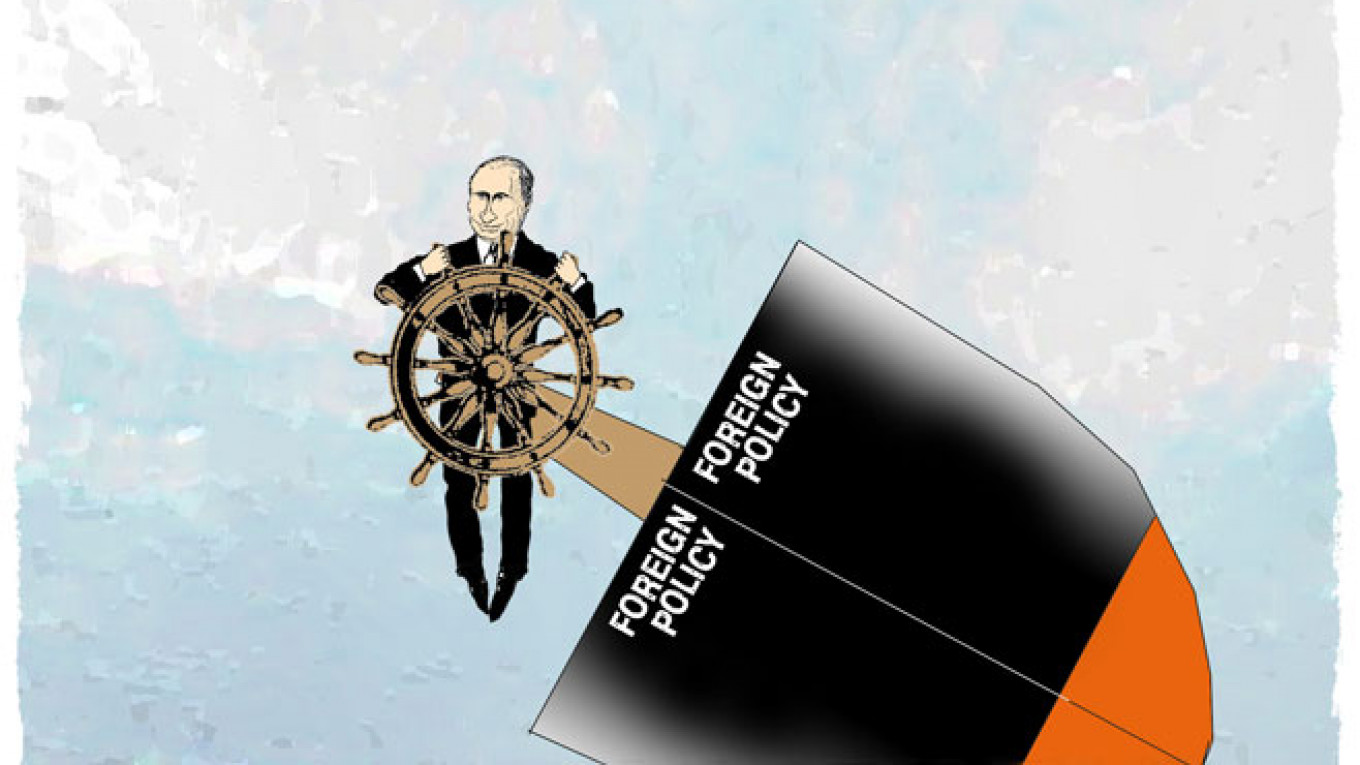President Vladimir Putin's unwillingness to endorse the separatist referendums in eastern Ukraine on May 11 caused some confusion in Western capitals. The first reaction of most Western media was to suggest that it was just part of a deception by Moscow — just as Putin had initially denied any Russian involvement in Crimean separatist actions.
Putin has embraced nationalism, not state interests, as the overarching rationale for his foreign policy decisions.
There are at least two ways to explain Putin's behavior during this evolving crisis. First, the conservative, "realist" position would argue that the main goal of Putin was to preserve Russia's "hard power" position by securing the Sevastopol naval base. Sevastopol is the only port on the Black Sea with berths deep enough to house Russia's Black Sea Fleet. Giving up Sevastopol would mean abandoning Russia's pretensions to be a naval power in the Black Sea and Mediterranean. It was pretty clear once Ukrainian President Viktor Yanukovych was ousted in February that any new nationalist government that replaced him would renounce the 2010 treaty extending Russia lease of the Sevastopol naval base through 2042.
It seems reasonable to assume that the siloviki — a pressure group that Putin cannot afford to ignore — insisted that Putin act to preserve Russia's military assets.
According to this analysis, Russia has been acting as a status quo power, trying to preserve the balance of power after the Soviet collapse.
People in the West may agree or disagree whether this was a desirable state of affairs. Some people in Washington will not be happy until Russia is pushed back beyond its 1780 borders. But an objective realist would probably conclude that Russia was behaving like any other status quo power.
But recent developments have made this realist perspective itself look quaintly anachronistic. It seems to have been displaced by a new approach which will be far more tricky for the West to deal with. Writing in the April 27 edition of Global Affairs, political scientist Igor Zevelev argued that Putin's thinking about Russia's place in the world has undergone a seismic shift over the past year — and especially over the past three months.
Putin appears to have decided to embrace ethno-nationalism and not state interests as the overarching rationale for foreign policy decisions. Defending the rights of ethnic Russians — and by extension Russian speakers — will henceforth be a central goal for Russian diplomacy. Russian leaders had paid some lip service to this dimension since the early 1990s but had never taken it very seriously. Even Russia's military intervention in defense of South Ossetia in August 2008 was more about protecting Russia's credibility as a military power than about preserving the rights of Ossetians and Abkhaz.
But the shift in rhetoric and thinking seems unmistakable, as evidenced by Putin's March 18 "victory speech" on the annexation of Crimea. And this comes against a background of parallel tectonic shifts in domestic policy — from the persecution of Pussy Riot and the "nationalization" of the elite through limits on foreign bank accounts to the dismantling of what remained of professional journalism.
Another sign of a paradigm shift is the appearance of members of Russian radical nationalist groups such as Russian National Unity among the leaders of separatist groups in eastern Ukraine, as political scientist Anton Shekhovtsov wrote in the April 28 issue of Open Democracy. These figures have had a very testy relationship with the government over the past two decades — sometimes favored by certain circles within the Kremlin but often suppressed. To see them playing a leading role on the front lines of Russian foreign policy is surely not accidental and represents a new and disturbing development. The fact that similar groups are operating on the Ukrainian side has just multiplied the potential for an explosive escalation of violence.
It is hard to say what exactly are the steps that the Ukrainian government could take to satisfy the new nationalist paradigm coming out of Moscow. In practice, Ukrainian nationalists had been unable to enforce a Ukrainianization program on Russian speakers in eastern Ukraine. Merely abstaining from changing the linguistic status quo may not be enough to satisfy the self-appointed leaders in eastern and southern Ukraine, who are also demanding a new federalist model. In the absence of a reliable court system and rule of law, there is a risk that an attempt to introduce federalism would be a recipe for endless squabbling and political polarization.
Western policy makers were already unhappy when they were trying to deal with Russia operating within the realist paradigm. They are now in for an unpleasant surprise. The new nationalist Russia will mean a far more unpredictable and conflict-ridden zone in the countries bordering Russia — unless, that is, diplomacy prevails and these disturbing developments are rolled back.
Peter Rutland is a professor of government at Wesleyan University, Connecticut, and is currently a visiting scholar at the University of York, England.
A Message from The Moscow Times:
Dear readers,
We are facing unprecedented challenges. Russia's Prosecutor General's Office has designated The Moscow Times as an "undesirable" organization, criminalizing our work and putting our staff at risk of prosecution. This follows our earlier unjust labeling as a "foreign agent."
These actions are direct attempts to silence independent journalism in Russia. The authorities claim our work "discredits the decisions of the Russian leadership." We see things differently: we strive to provide accurate, unbiased reporting on Russia.
We, the journalists of The Moscow Times, refuse to be silenced. But to continue our work, we need your help.
Your support, no matter how small, makes a world of difference. If you can, please support us monthly starting from just $2. It's quick to set up, and every contribution makes a significant impact.
By supporting The Moscow Times, you're defending open, independent journalism in the face of repression. Thank you for standing with us.
Remind me later.






